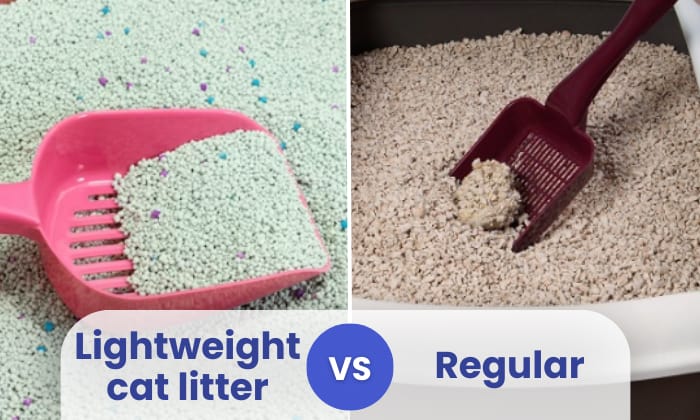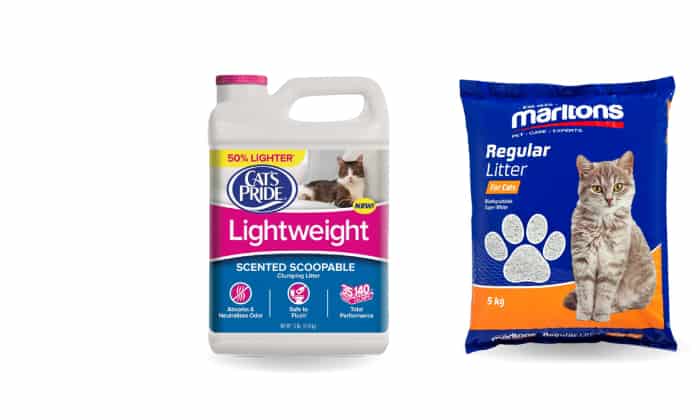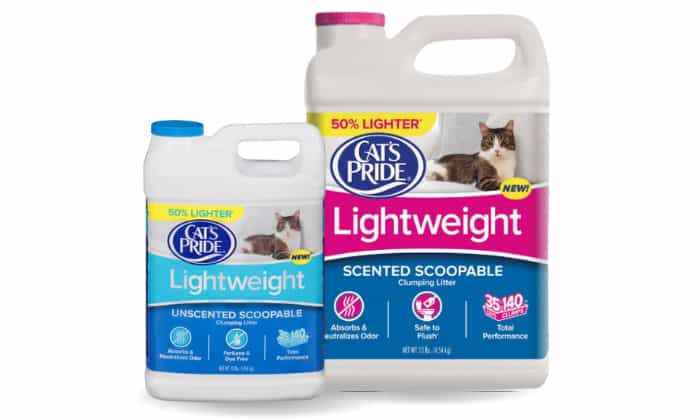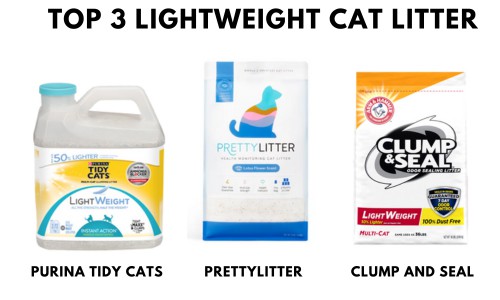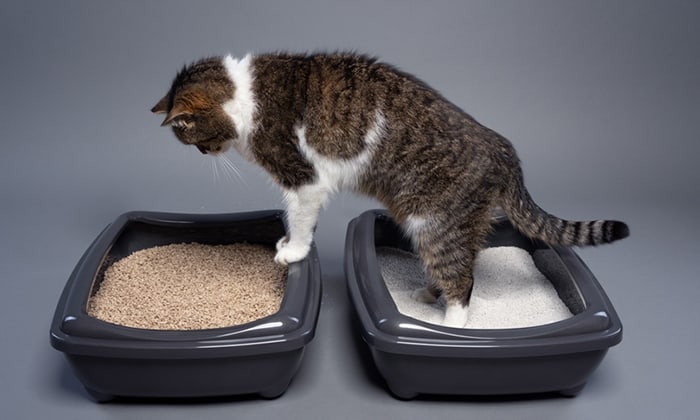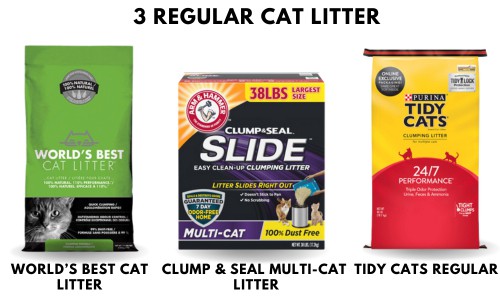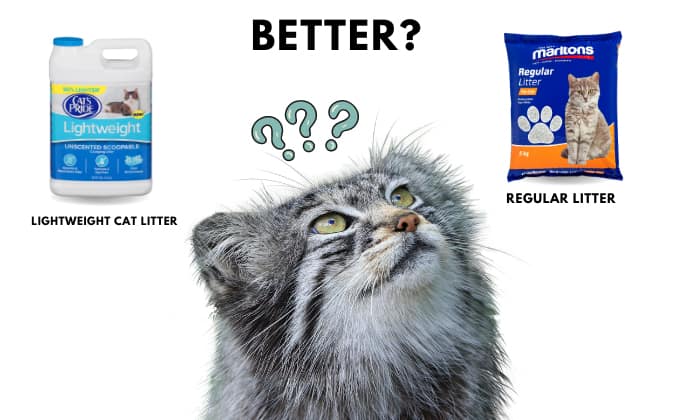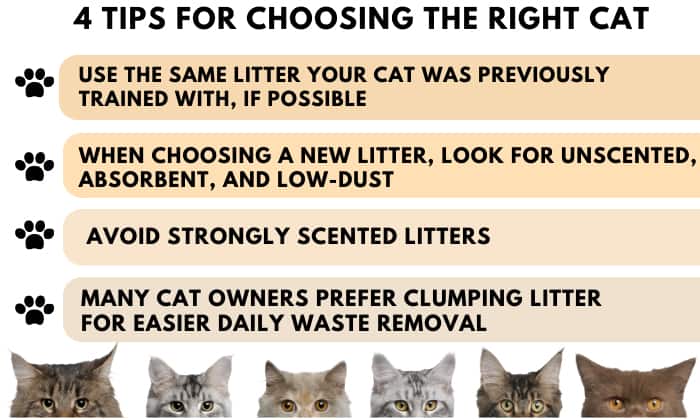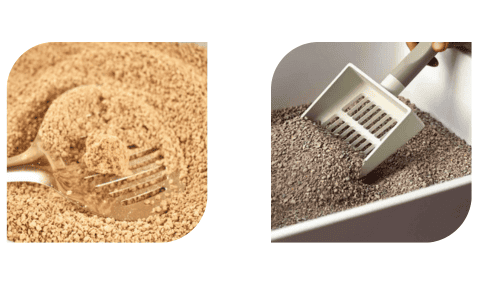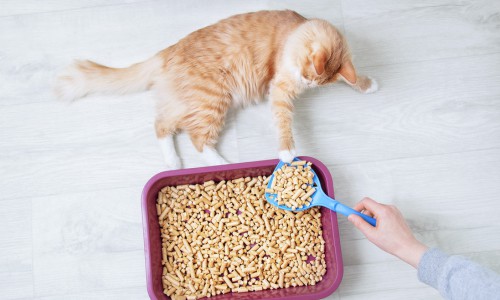As a cat owner, choosing the right type of litter for your feline friend is important. With so many options available, deciding between lightweight and regular cat litter can be overwhelming.
In this article, we will explore the pros and cons of lightweight cat litter vs regular litter so that you can select the best option for your cat’s health and convenience.
|
|
Lightweight Kitty Litter |
Regular Cat Litter |
|
Cost |
More expensive |
Budget-friendly |
|
Health risks |
Dangerous to one’s health (respiratory issues) |
No potential health risks |
|
Dusty |
Dustier |
Not as dusty compared to lightweight ones |
|
Odor control |
Better odor control |
Good odor control |
|
Cat litter weight |
Lighter which makes it easy to move, carry, and dispose of |
Heavier overall |
|
Tracking |
High tracking |
Doesn’t track much compared to lightweight litter |
|
Messy |
Messier because lightweight sticks to paws more |
Not as messy as lightweight, it doesn’t stick to paws as lightweight does |
|
Accessibility |
Can be bought anywhere |
Easy to buy anywhere |
Table of Contents
What is Lightweight Cat Litter?
Lightweight cat litter is a special type of litter that’s about 50% lighter than traditional clay-based litter. It’s made by mixing clay with lightweight materials like perlite, diatomaceous earth, bentonite, or Fuller’s Earth.
Due to its formula, this type of litter can be disposed of easily.
How Does Lightweight Cat Litter Work?
Just like regular clumping litter, lightweight cat litter works by absorbing moisture from cat urine and feces and forming clumps that can be easily scooped out of the litter box.
Despite the similarity, lightweight clumping is denser and more porous than regular ones.
You also don’t need to worry about the odor because you may mix baking soda to combat any unpleasant odor.
Hence, lightweight clumping cat litter is almost similar to regular clay litter but with additional perks – lighter and easier to dispose of.
Pros and Cons
- Easier to carry and scoop out of the litter box
- Fast wet absorption
- Can be bought either unscented or scented
- Easy to dispose of
- Cats like its soft texture
- Possibility of high tracking
- May have more dust than regular ones
- Not advisable to use for younger kittens
- Might costs more
- Possible health risks
Cost
Lightweight cat litter costs around $15 to $30.
Recommended products for lightweight cat litter:
Here are the suggested lightweight cat litter products:
- Purina Tidy Cats Lightweight Litter
- PrettyLitter Subscription Cat Litter
- Arm and Hammer Clump and Seal Lightweight Litter
What is Regular Cat Litter?
When it comes to cat litter, most pet owners are probably familiar with the traditional option: regular cat litter. This type of litter is made from a type of clay that is known for its absorbency, which makes it easy to scoop out of the litter box.
To help control unpleasant odors, regular cat litter is often mixed with other compounds like charcoal and baking soda.
How does regular cat litter work?
Regular cat litter, which is made of clay, functions by letting urine seep through to the bottom of the litter box, where the clay absorbs the moisture and accompanying smells. By scooping the litter daily, the odors are kept at bay.
However, this is a temporary solution, and the litter needs to be changed entirely every few days.
Pros and Cons
- Cheaper
- Accessible anywhere
- Easy to use
- Can be bought either unscented or scented
- Absorbent of liquid and can easily form clumps to be scooped out
- Preferred by most fur babies and cat owners
- Heavy to carry and dispose of
- Can be easily tracked
Cost
Regular cat costs vary depending on the type you want to buy. But generally, regular clumping litter costs around $10.
Recommended products for regular cat litter
- World’s Best Cat Litter Clumping Formula
- Arm & Hammer Clump & Seal Multi-Cat Litter
- Tidy Cats Regular
Which is Better: Lightweight Cat Litter vs Regular Litter
Weighing the benefits and the challenges that both cat litter present, regular cat litter is the better option for me.
Not only that it does not have the potential to harm your feline friend’s health, but also because among the two – the least messy is the regular litter.
This will save you time to clean and change the litter from time to time.
Tips for Choosing the Right Litter for Your Cat
- Use the same litter your cat was previously trained with, if possible.
- When choosing a new litter, look for unscented, absorbent, and low-dust options to avoid respiratory problems for your cat.
- Avoid strongly scented litters, as they may be unpleasant for your cat and cause them to be eliminated elsewhere.
- Many cat owners prefer clumping litter for easier daily waste removal, but it’s a personal preference.
Factors to consider in choosing the right cat litter
When choosing the right cat litter for your pet, there are a few factors to consider:
- Choose a litter suitable for your cat’s breed and size
- Consider the type of litter your cat prefers (clumping, wet, or dry pellets)
- Look for a litter that meets your cat’s specific needs (e.g., absorbent or light litter)
FAQs
Types of Cat Litter
- Clumping vs. non-clumping
- Clumping litter consists of bentonite clay – this clay forms small clumps when exposed to any liquid. Because of this, it is easier to scoop out and dispose of.
This is ideal if you only have one cat because you won’t need to change the litter frequently.
- Non-clumping, on the other hand, is made of Fuller’s Earth. Compared to clumping, it doesn’t form any clumps when it is exposed to liquid, but it absorbs the weight of it.
Recommended products:
- Scoop Away Multi-Cat Meadow Fresh
- Arm & Hammer Platinum Double Duty
- Purina Tidy Cats Non-Clumping Clay Litter
- Scented vs Unscented
-
- Scented cat litters have built-in additives to combat the unpleasant odor from your cat’s litter box, mainly feces, and ammonia.
- To cover the smell, most scented litter products have deodorizers and fragrances. The most common deodorizers are baking soda, charcoal, and carbon.
- Unscented litter, also known as odorless cat litter, does not have any additives to absorb or cover smells. The only thing it has is its natural odor – whichever it is composed of. It could either be pine, clay, or corn.
Recommended cat litters:
- Fresh Step Outstretch Concentrated Clumping Litter with Febreze Freshness
- Arm & Hammer Super Scoop Clumping Cat Litter, Fragrance Free
- Tidy Cats Unscented Lightweight Cat Litter
- Biodegradable vs Non-Biodegradable
- Clay litter is not known for being biodegradable, thus, it cannot decompose and will continue to harm the environment.
- Pellets, on the other hand, are biodegradable and eco-friendly since you can compose them after. Not only that, this specific litter is made of natural materials like lumber scraps – which does not danger the environment.
Tips for switching to a new cat litter
When transitioning your cat to a new litter, several tips can make the process smoother:
- Don’t make big changes as possible; transition in a gradual manner to make your cat comfortable to still use the litter box.
- Pour new cat litter and top it off with the old one so your cat won’t notice this little change and get accustomed.
Does lightweight cat litter last longer?
No, it doesn’t since it sticks easily to the cat’s paws and leads to tracking. Thus, gets less in amounts faster than the regular litter.
Can I mix lightweight and regular cat litter?
Yes, you can, but it is not advisable since cats prefer routine. However, you can do this when trying to switch from a lightweight cat litter to a regular one or vice versa.
What litter should cats avoid?
The cat litter you should avoid for your cat’s use is those that can potentially harm your cat – and this is one of the lightweight cat litter problems.
This was a popular question before, “Are lightweight litter killing cats?” and this question didn’t just pop out of nowhere. It is an alleged rumor that lightweight litter killed some cats after using it due to sudden lung issues.
Many cat owners did not recommend using the litter because of extreme dust, and high tracking.
So, if you are asking, “Is lightweight litter bad for cats?” you can only answer.
Although it is not advisable for kittens, I also do not recommend using it for your adult cats just to be cautious.
What are the ingredients of lightweight cat litter?
Most of lightweight cat litters have the following ingredients:
- Sodium bentonite
- Perlite
- Silica gel
- Deodorizers (baking soda and charcoal)
Conclusions
Lightweight litter vs regular litter is an important topic to research, especially since using litter is one of the essentials to take better care of your fur baby.
Remember that it’s your responsibility to keep your cat happy and safe. And based on this guide, I hope that this has helped you choose the suitable litter for your cat.
Whichever you choose, you need to consider vital points so that it doesn’t cost you much and less hassle for your part as well.

I am Amy Sawy, a Doctor of Veterinary Medicine (DVM) graduate from the University of Kansas. y husband, Dr. Plummer, and I own a veterinary clinic in Phillipsburg, Kansas. In addition to my professional background, I am a devoted pet owner myself, with a household that includes dogs, rodents, and most notably, cats – a total of five felines in my home.
In 2020, I joined an organization as a professional writer, leveraging my experience and collaborating with my team to deliver the most valuable information for your cat’s care.


